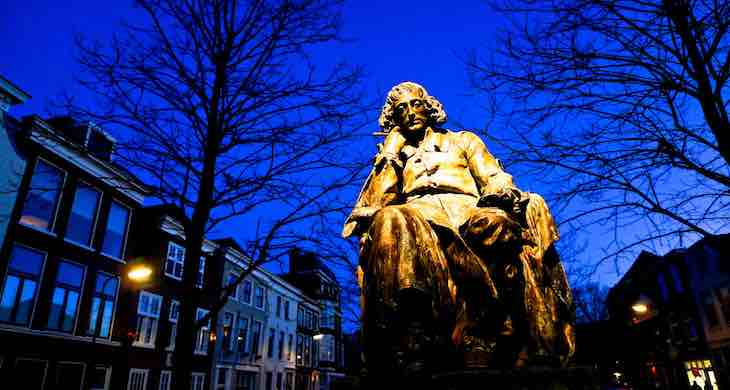Misadventures in Political Philosophy
Mahon O’Brien on the right sort of question to ask about Heidegger’s philosophy and politics
The recent furore surrounding the publication of some of Heidegger’s notebooks from the 1930s and 40s has been a cause celebre of the intellectual world for the last couple of years. Toward the end of 2013, a handful of sensational passages from Heidegger’s by now infamous Schwarze Hefte (Black Notebooks) were leaked (prior to their official publication in the Spring of 2014) and subsequently went ‘viral’. The immediate effect was the re-ignition of the controversy surrounding Heidegger’s support for National Socialism and the relevance of that political allegiance to his philosophy. Alas, the controversy began to play itself out (and has largely proceeded) along disappointingly familiar lines. That is to say, many of the people who immediately weighed in on the debate managed to kick up so much dust (dust which had only just resettled in the wake of Emmanuel Faye’s outrageous polemic) that people were left flailing around aimlessly without making any real progress. Not only that, the controversy was raging full throttle before the notebooks had even appeared. Thus, one has to suppose that the people who shouted loudest at this time were simply reprising views they already held as members of a rather partisan ideological philosophical ‘club’.
What is overlooked on each and every occasion that this controversy erupts is the way this debate polarizes, with many participants becoming embroiled in something of a phony war. That is to say, if either side proved correct, then there would be no real controversy. As I argued in my Heidegger, History, and the Holocaust:
[…] the controversy continues to be prosecuted by two polarized groups who continue to miss the question that should exercise all of us; these camps either try to nullify Heidegger’s Nazism and insist on his greatness as a philosopher as though the two are mutually exclusive or else they look to amplify his Nazism and diminish his stature as a philosopher—again—as though the notion of a great philosopher and a Nazi are mutually exclusive identities […] the question that needs to be addressed is not so much whether Heidegger is a good philosopher or a charlatan; if he is in fact a charlatan, then his political views are of little consequence. And again, as should by now be patently clear, if Heidegger wasn’t really a Nazi, then, in that case, there is really nothing for us to concern ourselves with, the controversy instantly dissolves. Moreover, if there is in fact no connection between Heidegger’s philosophy and his political actions and views, then there would, again, be little reason for us to concern ourselves.
The apologetics of deniers who wanted to maintain the image of Heidegger as nothing less than some celestial, non-sublunary exemplar who had only accidentally engaged with National Socialism for a moment in the early 1930s needed to be dismissed. And indeed, the recent notebooks have at least served one useful function in helping to debunk this particular myth; since the publication of the notebooks, Heideggerians can no longer credibly maintain that Heidegger was not an anti-semite or that his political views are completely unrelated to his philosophy. Furthermore, the intransigence of commentators who doggedly subscribe to the view that Heidegger is a philosophical charlatan is not somehow rendered philosophically plausible by the confirmation of the simple fact that Heidegger was at one point a vocal supporter of National Socialism. Their position is weakened further by the fact that many of them proudly profess to never really haven taken the time to try and read Heidegger at all.
I had been convinced that the Heidegger controversy was something that needed to be revisited anew for some time—long before there was any mention of the notorious Schwarze Hefte. The question that needed to be addressed, and which I address at some length in my recent work, is whether there is, in fact, any relationship between Heidegger’s philosophy and his political views. In order to ask this question, however, a lot of detritus left over from previous controversies needed to be cleared away.
Granted, a number of Heideggerians had looked to offer a more measured, albeit still somewhat wrongheaded, response to some of these issues following the initial shockwaves caused by the appearance of Victor Farias’s book in the late 80s when, along with the findings of the Freiburg historian Hugo Ott, it became clear that there were fairly serious problems with Heidegger’s ‘official story’, which survived more or less unchallenged up through the publication of his well-known interview with Der Spiegel in 1966 (published posthumously, in keeping with Heidegger’s wishes, in 1976). A number of French philosophers offered a more balanced and sophisticated interpretation of ‘l’Affaire Heidegger’ at that time and suggested, for example, that the issue of Heidegger’s political views in the early 1930s related to a tendency, easily enough confined to Heidegger’s earlier thought, towards metaphysical humanism, which clearly enough dovetailed with his option for National Socialism. Conveniently then, the aspects of Heidegger’s ‘later’ thought that they wanted to preserve remained unsullied by the Nazi stain infecting the earlier work.
However, with this move, the situation becomes all the more complicated since it chimes with the idea of a ‘turn’ or change in Heidegger’s thinking, which had gained something of a foothold in Heidegger scholarship, and now offers a rather convenient escape hatch for many Heideggerians. The idea of a change or turn in Heidegger’s thought, which Gregory Fried aptly characterizes as a kind of ‘biographical second sailing’, is not one to which I subscribe at all and relies, typically, on a disastrous misreading of some of Heidegger’s early work, in particular, his magnum opus, Being and Time. Furthermore, it overlooks the fact that Heidegger’s confrontation with modernity is not only absolutely consonant with his basic position in Being and Time and remains informed by that work, it is also based on a fundamental problem in his thought that he never quite manages to recognize and that is directly related to his political views. Moreover, the aspects of that confrontation with modernity that are related to this difficulty are not suddenly dropped from his later thought; they remain central to Heidegger’s project to the end of his career.
The stock response by less tractable, ‘hardcore’ Heideggerians to previous attempts to establish links between his philosophy and his politics was rather dismissive, owing, in the main, to the philosophical shortcomings of these attempts. And, to be fair, these studies are rightly dismissed by Heideggerians who can quickly point to the interpretive deficiencies of these texts. However, with that, one is not then entitled to summarily dismiss any question as to a possible relationship between Heidegger’s philosophy and his politics.
As it happens, Heidegger’s philosophy simply cannot be straightforwardly reduced to his political views; however, this is something that needs to be demonstrated, since it is Heidegger himself who says explicitly and repeatedly that the basis for his political views lies in the essence of his philosophy. Not only that—and this is something that has not been sufficiently acknowledged in previous incarnations of the Heidegger controversy—throughout the 1930s, Heidegger feverishly looks to articulate a political philosophy on the basis of key concepts in his thought, including central notions from Being and Time. This undertaking is fuelled by an attempt to resist modernity in ways that Heidegger cannot consistently maintain, yet which he thinks he can buttress using the notion of historicity in Being and Time. That is to say, Heidegger looks to rely on a condition for the possibility of the way being becomes meaningful for human beings—namely, our temporality or finitude—and then, expanding on what he calls the historicity of a person, looks to use this notion as a way of resisting the universal designs of modernity, valourizing instead the particular or the provincial. Granted, the facts of our finitude and historical specificity bear heavily on how any one of us has the identity we have, both as individuals and as members of a historically situated community. However, the concomitant underlying condition is a universal condition for the possibility of human freedom and thus is a universal, transcendental condition, even in Being and Time.
Heidegger relies on this same condition to condemn what happened to the inmates in the death camps during the Second World War and yet, in the 1930s, he wants to use that condition to privilege the status of the German people in particular. However, since the attempt to do this cannot possibly succeed and remain consistent with the theoretical foundations of his own thought, Heidegger is forced, in places, to resort to his own peculiar and somewhat ridiculous brand of ethnic chauvinism. To make matters worse, there are aspects of this ill-conceived attempt to formulate a political philosophy (in particular his idiosyncratic brand of anti-modernism) that he never relinquishes and stubbornly maintains to the end of his life.
What needs to be addressed in this particular controversy is not so much Heidegger’s ‘silence’, his moral failings, akrasia, opportunism, philandering—though they can serve as something of a salutary caution against those who continue to deify, in an alarmingly intemperate fashion, a human being with feet of the most putrid and densely textured clay. The question that needs to be addressed is not even really how a philosopher that many purport to be the most important thinker since Hegel could have been a Nazi, since, left in that form, one can see how such a question can easily be dismissed with counter-examples. Indeed, even when one might want to suggest that this question retains its significance directly as a consequence of the ‘content’ or themes of Heidegger’s philosophy, the question still does not hit the mark. Rather, the issue is whether and to what extent Heidegger’s philosophy is related to his politics and that, quite simply, is a question that has not been adequately addressed. And, despite being personally repugned in the extreme by the despicable creature that Heidegger was (a man suffering a destitution of moral fibre that is hard to countenance in such a gifted thinker whose work seems so profoundly important for any understanding of the human condition), my argument is that his philosophy for the most part resists his best efforts to reconcile his political views with the key concepts of his thought.
Again, as mentioned above, Heidegger’s attempts to articulate a political philosophy rely heavily on the notion of historicity in Being and Time; but our historicity is not something that belongs or pertains exclusively to any particular group of people. Rather, our being-towards-death (and thus our historicity) is the condition for the possibility of the manner in which being reveals itself as meaningful for any human being at any time or place whatsoever. Heidegger wants to kick away this transcendental ladder once he has made use of it, but then wants to use its rungs as a foothold again to condemn what happened to one particular community in the death camps when their authentic being-towards-death and thus their historicity was denied them—a community, moreover, that he insists in a 1933/34 seminar, are without history and thereby lack the capacity to belong to a state or to be authentic German citizens. In the end, Heidegger cannot possibly articulate the political philosophy that he wants to and remain consistent with the internal logic of texts such as Being and Time.
The Source Code
This post is based on the book Heidegger, History, and the Holocaust by Mahon O’Brien (Bloomsbury, 2015).






